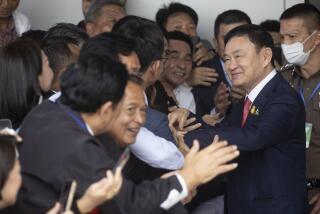Cambodia Government, Royalists in Tight Race : Southeast Asia: Early returns in landmark elections suggest that ruling party and its main opposition may have to form a coalition.
- Share via
PHNOM PENH, Cambodia — Early returns in Cambodia’s first free elections in decades today indicated that the Phnom Penh government and the opposition royalist party were running virtually neck and neck.
A United Nations spokesman released figures from the six days of voting for 10 of the country’s 21 provinces based on early partial returns. The Phnom Penh regime had won 41.1% of the overall vote, while the royalist party known as FUNCINPEC had 40.1%.
The government’s Cambodian People’s Party was leading in six provinces, which have 17 seats in the new 120-seat Parliament, while FUNCINPEC led in four provinces with 22 seats at stake. Since the election will be by proportional representation, it is likely that the two leading parties will share the seats in each province.
In the capital, Phnom Penh, FUNCINPEC took its biggest lead, with 88,735 votes to the Cambodia People’s Party’s 49,045. The capital has 12 seats in Parliament.
If the trend shown in early returns continues, it could force the two largest opponents to form a coalition of some kind, but this will be difficult following a violent, six-week campaign in which scores of FUNCINPEC officials were murdered.
Significantly, although there were 20 parties in the election, just two parties--CPP and FUNCINPEC--gathered the vast majority of votes while the others appeared to have been marginalized. Cambodia watchers stressed that the results were too preliminary for them to draw any firm conclusions from the voting.
Many reasons have been cited for voters choosing FUNCINPEC over the Phnom Penh government, which has ruled Cambodia for 13 years. One frequently cited is the desire for change by voters fed up with the former Communists in power.
Another reason is that many Cambodians viewed a vote for FUNCINPEC as a vote for Prince Norodom Sihanouk, who is widely revered here. FUNCINPEC is headed by Sihanouk’s son, Prince Norodom Ranariddh.
The Phnom Penh administration was installed by Vietnam in 1979 as the Vietnamese army drove the Khmer Rouge from power. It formed a Soviet-style Communist party that continues to rule the country, though it has abandoned socialism for market reforms.
The six days of voting in Cambodia were organized by the United Nations under an October, 1991, peace agreement between the country’s four warring factions. One of the factions, the detested Khmer Rouge guerrillas, pulled out of the peace plan and boycotted the elections.
Yasushi Akashi, head of the U.N. peacekeeping operation here, told faction leaders at a meeting of the Supreme National Council that he had certified the elections as free and fair.
“I wish to pay the warmest possible tribute to the Cambodian people who, through their courage, patience, good humor and commitment to peace and democracy, delivered a stinging rebuke to the men of violence and to those who tried to prevent them from exercising their inalienable rights,” Akashi said.
He added that the “outpouring of popular will should reinforce the commitment the parties have already made to respect the results of the election.”
The Clinton Administration joined in applauding the elections, saying the United States will recognize whatever government is installed after the vote count.
“The U.S. is prepared now--before the results of the election are known--to announce its intention to recognize the results of the polls should the U.N. certify the electoral process free and fair,” State Department spokesman Richard Boucher said.
The blanket endorsement was made a bit less risky because the Administration delayed until initial returns showed that the royalist party had taken a lead over the onetime Communists in the government. Although Washington insists that it is neutral in the election, officials have made no secret of their backing for Prince Sihanouk, leader of the royalist faction.
While the two opposition factions attending the Phnom Penh meeting unambiguously agreed to accept the results, the response of Premier Hun Sen of the Phnom Penh administration was vague. Hun Sen said the government and its party “were awaiting the election results with the hope that the counting of the votes would proceed in strict conditions which would allow all concerned parties to satisfactorily accept the results.”
Fears have been mounting since the polls closed Friday that the Phnom Penh administration, which controls 80% of the country and fields the biggest army, could refuse to hand over power if it suffered a stunning loss, and might repudiate the result on the grounds of voting irregularities.
In an effort to smooth the transition from multiple administrations to the new government, Akashi proposed Saturday the forming of a “round table” consisting of leaders of the four factions and representatives of the winning parties to discuss the transfer of power.
Under the peace accord, U.N. forces will remain in Cambodia for three months to allow the assembly to write the constitution and form the next government.
Times staff writer Norman Kempster in Washington contributed to this report.
More to Read
Sign up for Essential California
The most important California stories and recommendations in your inbox every morning.
You may occasionally receive promotional content from the Los Angeles Times.













